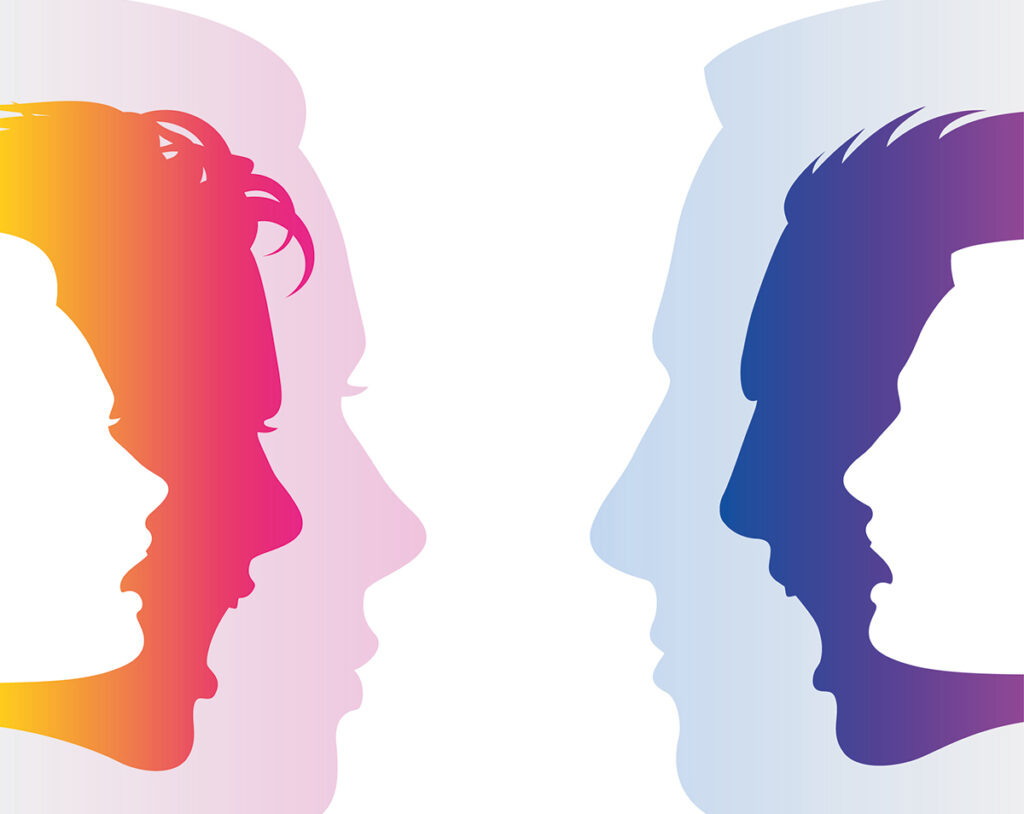Some men believe that feminism is exclusively a movement for women and that it is about empowering the one while taking from the other. In this short article, I will lay out why it is desirable for men to become feminists and support women in their struggle for equal access to opportunity and rights. Men have much more to win than lose by siding with women.
Most men, including trans-men, know the following situation in one way or another; either a friend has told them about a similar experience, or they had it happen to themselves. Either way, at some point in their life, a lot of men have come across a woman who has confronted them about the way they act toward women or something they said about women, including trans-women, usually in their presence. Maybe, an individual man thought he should voice that he believes he has a right to sex, or that the “me too” movement has gone too far because he knows someone, who has a friend, who has a cousin, who was wrongfully accused of sexual assault. Perhaps, another man believed that catcalling is a form of complimenting women and if that is now labelled as harassment, then how are men supposed to approach women at all? Or, hypothetically, a man told a bit of a dark humoured, but nonetheless sexist joke about domestic abuse and about how women belong in the kitchen and laundry room.
As pointed out in The Right to Sex by Amia Srinivasan but also activists’ protests during Orange Week1, these are comments that are anything but rare. Statistically speaking, you can find them at almost any workplace dominated by men, and in almost any household, and in any friendship group of men. The type of man who says these things, makes such jokes, and holds such beliefs (or knows men who do), will only know feminists in a negative light because after all, they want to take away his freedom of speech in expressing these opinions and making such jokes. After all, it is not like he’s hitting the woman, or, forcing her to do the laundry and clean up the kitchen. For most men, again, according to Srinivasan, that is as far as it goes for them in a daily setting. They don’t want to be forced to be empathetic with women and side with their struggles for freedom of oppression, therefore, turning their backs on all their buddies still making these jokes.

This sort of joking around is mostly of a performative nature, as Judith Butler describes in her work Gender Trouble. They want to show their other male friends that they, too, are real men. They’d rather have each other’s backs and make sure to stay on top of the food chain, in a cultural and political sense, rather than side with the obviously oppressed. These men are, in some sense, aware that what they do is a double-edged sword.
If some men were to side with women, they’d become part of the punching bag of the joke. They’d be harassed, they’d paint a giant target on their back, practically begging for anti-feminist men to make fun of them. So, the men making these jokes, who claim to be merely exercising their freedom of speech, should know exactly what it is they do. It is never just a joke.
The other thing that turns men off from feminism and its activism, is that feminism means work.
The other thing that turns men off from feminism and its activism, is that feminism means work. You may not take it personally, but the woman you’re punching down on most definitely will. It also means learning that exercising your freedom of speech in that way goes hand in hand with actual physical abuse. In this scientific study2, it was shown that anti-feminist and misogynistic speech online, which goes unpunished, directly connects to a rise in femicides, meaning the killing of girls and women. So, even if the man making a joke about domestic abuse does not equate to him physically hurting a woman or girl, it does normalise the idea of that behaviour. Let alone the fact that the “joke” itself is likely to hurt one in three women (statistic of women who have been assaulted at least once in their lifetime from 16 years of age)3.
Why am I citing these statistics and, some may argue, making men look bad? Well, it is to show why men don’t want to become feminists. Now that I have generally and simply outlined the idea, I’ll go into why becoming a feminist overrides the downsides of the work and becoming the target of demeaning jokes and similar behaviour.
In a nutshell: the patriarchy takes advantage of men’s social loneliness, thus, men can become less lonely by embracing the feminist struggle for themselves. That is how they can directly benefit from joining the fight, politically as well as culturally. In addition, it will teach them something that patriarchy has stripped them of: empathy for everyone. While still under the influence of the patriarchy, men will mostly, or sometimes only, feel empathy for the male population. And even then, again according to Srinivasan but also author Bell Hooks in The Will to Change, men won’t even feel empathy toward other men, depending on the cause of their suffering.
First off, how does the patriarchy take advantage of men’s loneliness and in what sense are men lonely in the first place? This article4 outlines the issue in terms of subjective experience where men have fewer and fewer friends as well as romantic and sexual partners. This is mostly due to men shutting themselves off from relationships on an emotional level because, according to the ideal patriarchal man, men don’t show emotions unless they are anger or rage, frustration or sexual lust. This is the emotional core of men’s gender performativity.
Men are nearly four times more likely than women to commit suicide due to feelings of loneliness.
Now, the lonelier men are, the more the patriarchy can keep them in check; the more human connections they make with people who are different from them, the more they become men divergent from the patriarchal ideal, meaning, men who are empathetic, men who show all kinds of emotion, share thoughts critically and inform themselves on cultural and political issues. All this activity is bound to make them feel connected to others because others will feel understood and seen by these men making an effort to see beyond their own lived experience. This works against the patriarchy, given that it wants men, all on their own, to be the cultural and political apex.
Power and control over others come at a really high price and it is not worth a man’s life and emotional well-being. Men are nearly four times more likely than women to commit suicide due to feelings of loneliness5. As exemplified by men’s mental health movements like Movember6 (one of the movements that is women friendly), when men start to take care of their own mental and physical health, they become more open to other forms of masculinity, thus, slowly but surely leaving behind older forms of being a man and freeing themselves partially of the patriarchy.
Finally, referring to the research discussed so far, men may get the impression that they are hated. However, men are not essentially bad and that is not the purpose of the research. They never were bad, nor will they ever be. We are raised to believe that women are inferior to us in many regards so that we may never connect with them on an authentic level. All in the name of cultural and political power over others. This superiority complex towards women can be unlearned as empathy can be taught by feminist movements. And so, men’s place amongst women is learning empathy and teaching it to other men.
- A time during every year (end of November, early December) where political activists shed a light on the abuse of women and what to do about it.
- http://tinyurl.com/verbalvlnc (Visited last, as every following source in the footnotes, on the 20th December 2023.)
- http://tinyurl.com/vlncwmn
- http://tinyurl.com/ml-lnlnss
- https://afsp.org/suicide-statistics/
- https://eu.movember.com/
Pierre Balthasar is a 28-year-old PhD candidate in Luxembourgish Studies, a writer and a member of Déi Lenk.
Als partizipative Debattenzeitschrift und Diskussionsplattform, treten wir für den freien Zugang zu unseren Veröffentlichungen ein, sind jedoch als Verein ohne Gewinnzweck (ASBL) auf Unterstützung angewiesen.
Sie können uns auf direktem Wege eine kleine Spende über folgenden Code zukommen lassen, für größere Unterstützung, schauen Sie doch gerne in der passenden Rubrik vorbei. Wir freuen uns über Ihre Spende!
